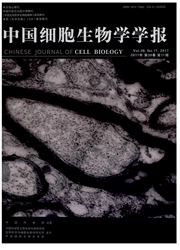

 中文摘要:
中文摘要:
该文旨在探讨带核定位信号的维甲酸受体α(nuclear localization signal retinoic acid receptor alpha,NLS-RARα)对人急性早幼粒白血病(acute promyelocytic leukemia,APL)细胞株NB4分化的影响及其机制。免疫印迹实验检测全反式维甲酸(all-trans retinoic acid,ATRA)诱导的NB4细胞分化标志物C/EBPβ、CD11b和p38α蛋白质水平;利用慢病毒介导的NLS-RARα基因过表达,进一步用免疫印迹实验验证过表达效率并检测NLS-RARα对NB4细胞分化标志物C/EBPβ、CD11b和p38α蛋白质水平的影响;间接免疫荧光实验分析NLS-RARα与p38α的空间共定位;免疫共沉淀实验分析NLS-RARα与p38α的相互作用。结果显示,生理浓度和药理浓度的ATRA促进NB4细胞分化的同时也激活了p38α,且p38α的活性变化与髓系分化标志物C/EBPβ变化一致;髓系分化表面标志物CD11b表达量在药理浓度ATRA(1μmol/L)处理下达到最高;NLS-RARα抑制NB4细胞的分化,且只有在ATRA存在的条件下,NLS-RARα抑制NB4细胞的分化与下调p38α活性相关;NLSRARα与p38α存在空间共定位且NLS-RARα与p38α直接相互作用。该研究结果提示,当存在ATRA诱导时,NLS-RARα与p38α直接相互作用后下调p38α的活性进而抑制NB4细胞的分化。
 英文摘要:
英文摘要:
This paper is to investigate the effects of NLS-RARα on differentiation of human promyelocytic leukemia cell line NB4 and its potential mechanisms. The expressions of myeloid differentiation markers, C/EBPβ and CD1 lb, p38α induced by ATRA in NB4 cells were detected by Western blot. NLS-RARα was overexpressed mediating by lentivirus and its efficiency of NLS-RARα overexpress, the expressions of myeloid differentiation markers, C/EBPβ and CD1 1b, p38α were detected by Westem blot. The localization of NLS-RARα and its interaction with p38α was analysed by indirect immunofluorescence assay and co-immunopreci-pitation assay, respectively. Our results demonstrated that the two ATRA concentrations (physiological [10 nmol/L] and pharmacological [ 1 μmol/L] concentrations) that we investigated promoted differentiation and activated p38α in NB4 cells. Further, ATRA-induced expression of the myeloid differentiation marker, C/EBPβ, was proportional to phosphorylated p38α (p-p38α). We also observed a higher peak in the surface of myeloid differentiation marker, CDllb, following treatment with pharmacological concentrations of ATRA (1 μmol/L). NLS-RARα also inhibited NB4 cell differentiation, more importantly, this effect was related to downregulation of the active form of p38α in the presence of ATRA. Finally, co-localization of NLS-RARα and p38α in three-dimensional space was confirmed, and we found that NLS-RARa could interact with p38α directly. Taken together, these data indicated that NLS-RARa inhibited ATRA-induced differentiation of NB4 cells by downregulating the active form of p38α via a direct interaction with p38α.
 同期刊论文项目
同期刊论文项目
 同项目期刊论文
同项目期刊论文
 Homogeneous noncompetitive assay of protein via Forster-resonance-energy-transfer with tryptophan re
Homogeneous noncompetitive assay of protein via Forster-resonance-energy-transfer with tryptophan re Aberrant production of soluble inducible T-cell co-stimulator (sICOS) and soluble programmed cell de
Aberrant production of soluble inducible T-cell co-stimulator (sICOS) and soluble programmed cell de Lithium chloride promotes apoptosis in human leukemia NB4 cells by inhibiting glycogen synthase kina
Lithium chloride promotes apoptosis in human leukemia NB4 cells by inhibiting glycogen synthase kina Kinetic Analysis of the Lactate-dehydrogenase-coupled Reaction Process and Measurement of Alanine Tr
Kinetic Analysis of the Lactate-dehydrogenase-coupled Reaction Process and Measurement of Alanine Tr 期刊信息
期刊信息
